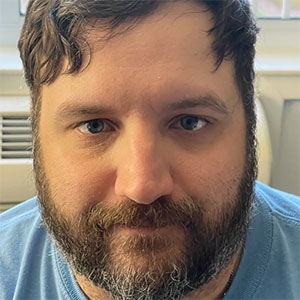Science interrupted
Undergraduates face a critical choice as graduation nears: enter a graduate program immediately or postpone.
Graduate school in the biomedical sciences can be an intimidating prospect. In order to solve graduate-level research problems, students are asked to apply creatively concepts and principles that they were asked only to absorb during college. Other factors, including financial, familial and professional, influence the decision to go to graduate school.
Often these factors prompt students to take gap years, or time off between undergraduate and graduate studies, to better decide what to do. Occasionally, however, gap years are forced upon the student, such as for health considerations.
Gap years may even occur once graduate school is already underway. That was my situation.
Culminating accomplishment
I completed my four years of college at the University of Maine in May 2006. I decided to pursue a Ph.D. in biochemistry the next semester. I had been working in my thesis adviser’s lab for a couple of years and enjoyed research immensely, despite the failed experiments and negative results! e biological and biomedical sciences Ph.D. program at Harvard Medical School accepted me.
I remember vividly the elation I felt upon receiving the substantial admissions package in the mail at my tiny dormitory in Maine. Few feelings have come close to the satisfaction and sense of accomplishment I experienced at that moment. I felt ready to tackle any challenge come autumn.
The onset
I began graduate studies at Harvard in September 2006. My first-year classmates and I were wide-eyed and enthusiastic, imagining that we could conquer the world and any scientific problem in it. I began my first lab rotation in a yeast biochemistry lab that studied scaffold proteins, the molecular platforms that help organize the cell and direct other proteins.
I had three introductory courses: molecular biology, genetics and literature review. Brilliant professors taught each class, endlessly inspiring and intellectually stimulating us students. I was overjoyed to be in what I considered the biomedical center of the universe.
I was progressing smoothly through my first semester in both my rotation and courses. I thought nothing stood between success and me.
That illusion crashed to Earth in mid-November, the day after watching the Harvard– Yale football game in Cambridge, Mass, with my parents. I suddenly felt a great general anxiety, and my emotions flew out of control. Gentle, normal waves of different moods were replaced by staggering highs and precipitous lows. e worst part was my ignorance of what was happening to my mind.
Lost focus
These experiences persisted and were an enormous disruption to my graduate studies. Concentration was nearly impossible since I had no internal regulation of my moods.
I failed tests, dropped out of rotations and withdrew from my peers. I was able to join a thesis lab, studying Drosophila neurodevelopment, and pass my qualifying exam only out of sheer determination.
I managed to remain a full-time student until May 2008. At that point, I lost my self-direction and decisive powers, quit my thesis lab, and took a leave of absence.
I met with an endless stream of professors during the leave but couldn’t gain any professional traction. Everything felt boring, empty and pointless. My leave lasted a year and a half, and in consultation with my program administration, I eventually decided to leave the Ph.D. program. My situation worsened after losing what professional structure I had left. The bottom and recovery My mental health continued to deteriorate after leaving Harvard, to the point that I was hospitalized in psychiatric units twice, in January and March 2010. at was the darkest and most frightening experience of my life. I did not know whether I would live or die by my own hand.
After my second hospitalization at McLean Hospital in Belmont, Massachusetts, a psychiatrist there offered to work with me. She diagnosed me with bipolar disorder, and over the next few months we found stabilizing medication that helped me function.
The next five years, from the summer of 2010 to spring of 2015, were difficult. I drifted in and out of jobs and relationships as my medication was adjusted and I tried to find mental balance.
In April 2015, I began working as a research assistant in a lab at Boston Children’s Hospital with a professor who understood my predicament and gave me a chance. I improved significantly over the next year thanks to my work, family support and finding the right combination of medications.
Unexpected return
In October 2015, my principal investigator suggested that I apply for readmission to my former Ph.D. program at Harvard Medical School. She thought I was having great success in her lab, and she believed in me.
I discovered that there is a readmission process separate from the standard application, so I submitted the required documentation. I was accepted back into the biological and biomedical sciences Ph.D. program at Harvard Medical School in February, in time for my 32nd birthday.
It had been almost 10 years since I first entered the program in 2006. We planned that I would resume working in my current PI’s lab on Aug. 1 of this year.
I cannot express how grateful I am to all involved in my readmission. It is a triumph I never expected to happen and testifies to what can be accomplished through modern medicine, support, faith and willpower.
I feel prepared to succeed this time, tackling eagerly any challenge or obstacle. My plan is to finish in two years, as my qualifying exam, my teaching requirement and the majority of my coursework are finished.
I am now confident that my future is bright and limitless. My involuntary gap years have come to a close.
Related stories

Focus on the gap year. We wondered how stepping off the road of higher education influenced people's careers and outlook on life. Find out what our essayists had to say.
A gap year … or a few? Marya S. Sabir writes about considering postbac programs before graduate or medical school.
Taking time before a Ph.D. Careers columnist Elizabeth Stivison talked to four people who, like her, found direction and learned a lot about themselves by working between undergrad and grad school.
Enjoy reading ASBMB Today?
Become a member to receive the print edition four times a year and the digital edition monthly.
Learn moreGet the latest from ASBMB Today
Enter your email address, and we’ll send you a weekly email with recent articles, interviews and more.
Latest in Opinions
Opinions highlights or most popular articles

Sketching, scribbling and scicomm
Graduate student Ari Paiz describes how her love of science and art blend to make her an effective science communicator.

Embrace your neurodivergence and flourish in college
This guide offers practical advice on setting yourself up for success — learn how to leverage campus resources, work with professors and embrace your strengths.

Survival tools for a neurodivergent brain in academia
Working in academia is hard, and being neurodivergent makes it harder. Here are a few tools that may help, from a Ph.D. student with ADHD.

Hidden strengths of an autistic scientist
Navigating the world of scientific research as an autistic scientist comes with unique challenges —microaggressions, communication hurdles and the constant pressure to conform to social norms, postbaccalaureate student Taylor Stolberg writes.

Black excellence in biotech: Shaping the future of an industry
This Black History Month, we highlight the impact of DEI initiatives, trailblazing scientists and industry leaders working to create a more inclusive and scientific community. Discover how you can be part of the movement.

Attend ASBMB’s career and education fair
Attending the ASBMB career and education fair is a great way to explore new opportunities, make valuable connections and gain insights into potential career paths.

